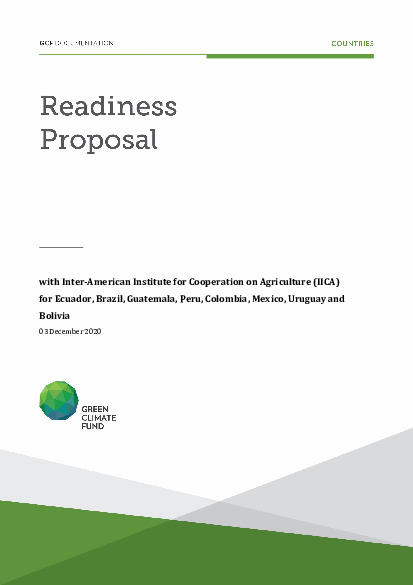Post COVID-19 Green Recovery for Food, Health, and Water Security strengthened by financial and technological innovations in Latin-American countries

Post COVID-19 Green Recovery for Food, Health, and Water Security strengthened by financial and technological innovations in Latin-American countries
The COVID-19 pandemic is a global health crisis that is already having devastating impacts on the world economy – both directly and through necessary measures to contain the spread of the virus. These impacts are also being felt by the food and agriculture sector. While the supply of food has held up well to date, in many countries, the measures put in place to contain the spread of the virus are starting to disrupt the supply of agro-food products to markets and consumers, both within and across borders. The sector is also experiencing a substantial shift in the composition and – for some commodities – the level of demand.
As the Economic Commission for Latin America and the Caribbean (ECLAC) and International Labor Organization (ILO) pointed out, during the pandemic, movement restrictions generated disruptions in some food supply chains, affecting especially perishable commodities. Furthermore, it resulted in the loss of jobs and a reduction in farmers’ income given that they are unable to sell their produce in local markets.
How damaging these impacts turn out to be for food security, nutrition and the livelihoods of farmers, and others working along the food supply chain will depend in large part on policy responses over the short, medium and long term. While the pandemic poses some serious challenges for the food system in the short term, it is also an opportunity to accelerate transformations in the food and agriculture sector to build its resilience in the face of a range of challenges, including climate change.
The central aim of this proposal is to outline pathways for post COVID-19 Green Recovery strategies in the Food, Health and Water sectors by supporting national and regional efforts of the targeted countries to strengthen financial and technological innovations. Hence, this Readiness Proposal will contribute to overcoming institutional, technical, and financial barriers in the agricultural sector, specifically to medium and smallholder farmers, through public institutions in environmental, agriculture, and national finances and economics sector, to encourage the adoption of advanced technologies, which accelerate economic recovery and employment creation, and improve farmers’ livelihoods while reducing CO2 equivalent emissions in the face of the global pandemic.
Barriers and gaps considered in this Readiness proposal include: Isolation, absence of communication and little positive evidence of collaboration between political actors and innovation systems; weaknesses in mechanisms that allow the identification of the common causes of flaws in agrarian systems in the face of Post CODIV-19 and climate change to redesign their structure, organization, and operation; minimal knowledge of Green Recovery innovative mechanisms and enabling investments for the implementation of technological innovation solutions and; limited experience and involvement of the regional innovation ecosystem with the needs of the agricultural sector, aggravated by the pandemic.
This readiness proposal is focused on post-COVID-19 Green recovery and the importance of designing green, resilient recovery efforts for Food Security in Latin- American countries, with direct beneficiaries as the national public institutions for public policymaking in targeted countries, including Ministries/Secretaries of Environment and Natural Resources (8), Agriculture (8), and Finance/Planning (5), some of which are National Designated Authorities.